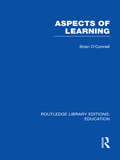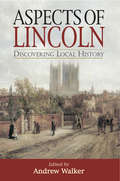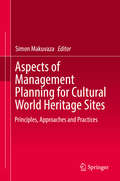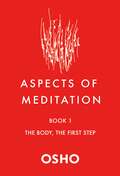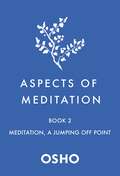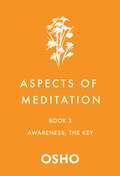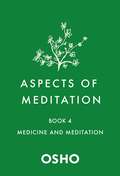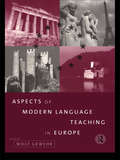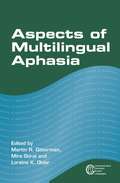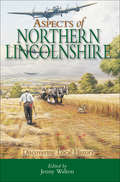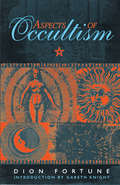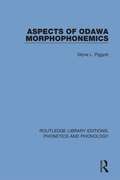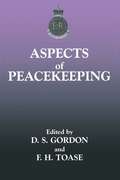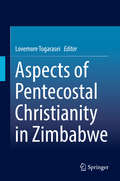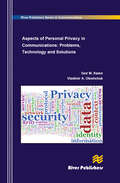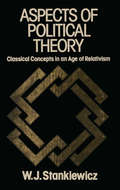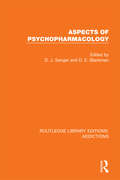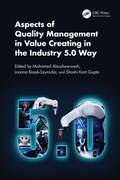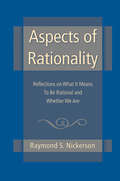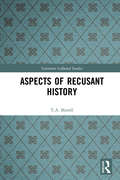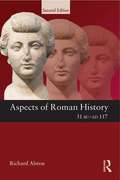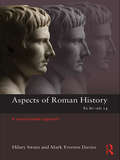- Table View
- List View
Aspects of Learning (Routledge Library Editions: Education)
by Brian O'ConnellThe time has passed when learning was identified purely as a process involving the ability to store and recall knowledge and facts, and the competence to produce them when required. These abilities still seriously concern the potential teacher and this book duly examines them, but the ‘whys’ and the ‘hows’ of learning and teaching are now considered as important as the implanting of facts for regurgitation at exam time.Some children learn more quickly than others, some can remember facts more easily, and a teacher must ask several fundamental questions in order to understand the factors at work in this learning process. Where is knowledge stored? Why do we remember some facts and forget others? When are we learning new facts and when are we remembering and adapting knowledge to see it in a new light? To help answer these and many other questions a number of learning situations, typical in most schools, are examined, the processes at work in the classrooms are examined and then they are both related to different theories of learning. The examination of a series of learning processes should not necessarily involve a choice between them, and a feature of this volume is its lack of partiality towards any particular teaching method, although the teacher and student will draw their own conclusions.
Aspects of Lincoln: Discovering Local History
by Andrew WalkerAspects of Lincoln, is the first in the widely acclaimed Aspects series to feature the City of Lincoln. However the Aspects series now extends from the east and west Midlands, up to Lancaster in the north-west and the north Yorkshire coast in the east.Aspects of Lincoln, is a multi author book containing 12 pinpoint historical essays covering such diverse subjects as: Cinemas and Cinema Going in 20th Century Lincoln, Getting Drunk in 17th Century Lincoln, the story of Emily Gilbert, motoring pioneer and first woman sheriff of Lincoln. No story of Lincoln would be complete without Royal Air Force Bomber Command during World War 2, and here, we examine the social impact of the airfields and their staff on both City and County. In a more peaceful vein, we study the work of artist Peter de Wint and the importance of his works, now held in the Usher Gallery. Elsewhere we encounter the development of technical education in the City and remember the plight of those imprisoned in Lincoln's jails during the eighteenth and nineteenth centuries. These and much much more are to be found between the covers of Aspects of Lincoln. A treasury of history, both for the armchair historian and the student alike.
Aspects of Love in John Gower's Confessio Amantis (Studies in Medieval History and Culture)
by Ellen S. BakalianFirst published in 2004. Routledge is an imprint of Taylor & Francis, an informa company.
Aspects of Management Planning for Cultural World Heritage Sites: Principles, Approaches and Practices
by Simon MakuvazaReviews links and synergies with other legal instruments such as the UNESCO Recommendation on International Principles Applicable to Archaeological Excavations and the Convention on the Means of Prohibiting and Preventing the Illicit Import, Export and Transfer of Ownership of Cultural Property.<P><P> Highlights implementation and effectiveness of such participation strategies with regard to the management of World Heritage Sites.<P> Archaeological World Heritage sites offer invaluable information on the past of humankind for present and future generations, thereby contributing to long-term sustainable development in line with the recently adopted World Heritage Sustainable Development Policy.<P> Every site that is inscribed on the World Heritage List (WHL) must have a management plan or some other management system. According to the UNESCO Operational Guidelines, the purpose of a management plan is to ensure the effective protection of the nominated property for present and future generations. This requirement was in part necessitated by the need to implement real systems of monitoring on the management of World Heritage Sites.<P> Since its implementation in 2005, discussion on the function and the contents of management plans for World Heritage Sites has grown tremendously. The discussions have mainly been focused on the theoretical frameworks of World Heritage site management plans and proposals of practical guidelines for their implementation.<P> This volume provides a platform for heritage practitioners, especially those working at Cultural World Heritage Sites, to put in writing their experiences and impressions about the implementation of site management plans at properties that are inscribed on the WHL. Cultural World Heritage Sites in this case refer to world heritage properties such as archaeological sites, cultural landscapes, religious sites and architectural structures. The book also seeks to examine the extent to which site management plans have been or are being implemented at Cultural World Heritage Sites.
Aspects of Meditation Book 1: The Body, the First Step (Aspects of Meditation #1)
by OshoIn spiritual teacher Osho's Aspects of Meditation Book 1: The Body, the First Step, you'll discover a deeper understanding of meditation through an investigation into the subtle workings of the mind, focusing on the body.The West has taken to meditation with great enthusiasm. We contemplate. We concentrate. We embrace mindfulness techniques and a multitude of mantras. We have undertaken to “do” meditation.The Aspects of Meditation series is comprised of brief, precious texts in which Osho shows us the core of meditation is not about sitting silently or chanting a mantra. It is, instead, a question of understanding the subtle workings of the mind. In Book 1, Osho re-introduces us to our body, focusing on the “root” of the human, the soul.
Aspects of Meditation Book 2: Meditation, a Jumping Off Point (Aspects of Meditation #2)
by OshoIn spiritual teacher Osho's Aspects of Meditation Book 2: Meditation, a Jumping Off Point, you'll discover a deeper understanding of meditation through an investigation into the subtle workings of the mind—concentration as a way to discover the self.The West has taken to meditation with great enthusiasm. We contemplate. We concentrate. We embrace mindfulness techniques and a multitude of mantras. We have undertaken to “do” meditation.The Aspects of Meditation series is comprised of brief, precious texts in which Osho shows us the core of meditation is not about sitting silently or chanting a mantra. It is, instead, a question of understanding the subtle workings of the mind. In Book 2, Osho explores the purpose of meditation: to discover the self.
Aspects of Meditation Book 3: Awareness, the Key (Aspects of Meditation #3)
by OshoIn spiritual teacher Osho's Aspects of Meditation Book 3: Awareness, the Key you'll discover a deeper understanding of meditation through an investigation into the subtle workings of the mind—transforming the unconscious through awareness.The West has taken to meditation with great enthusiasm. We contemplate. We concentrate. We embrace mindfulness techniques and a multitude of mantras. We have undertaken to “do” meditation.The Aspects of Meditation series is comprised of brief, precious texts in which Osho shows us the core of meditation is not about sitting silently or chanting a mantra. It is, instead, a question of understanding the subtle workings of the mind. In Book 3, Osho explores different states of unconsciousness and the ways in which they can transform awareness of the here and now.
Aspects of Meditation Book 4: Medicine and Meditation (Aspects of Meditation #4)
by OshoIn spiritual teacher Osho's Aspects of Meditation Book 4: Medicine and Meditation, you'll discover a deeper understanding of meditation through an investigation into the subtle workings of the mind, focusing on questions of health and illness.The West has taken to meditation with great enthusiasm. We contemplate. We concentrate. We embrace mindfulness techniques and a multitude of mantras. We have undertaken to “do” meditation.The Aspects of Meditation series is comprised of brief, precious texts in which Osho shows us the core of meditation is not about sitting silently or chanting a mantra. It is, instead, a question of understanding the subtle workings of the mind. In Book 4, Osho examines health and illness, disease and well-being as outgrowths of our sense of self and connection to our mind.
Aspects of Modern Language Teaching in Europe
by Wolf GewehrFrom the teaching of grammar to the teaching of literature; from classroom teaching to independent learning; from role-playing to CAL - few books on teaching languages cover such a wide field. In this book teaching experience and research from practitioners in four European countries throw new light on old problems faced every day, while others reveal innovative teaching methods and new insights into how teachers and learners interact. Sections include: *language learning strategies and computer-assisted language learning *facilitating individual progress through autonomous learning *how to bring a foreign country alive in the classroom *de-mythologising grammar teaching *how different types of dictionaries can make valuable contributions to language teaching *teaching and using idiomatic phrases.
Aspects of Multilingual Aphasia
by Martin R. Gitterman Mira GoralThis volume provides a broad overview of current work in aphasia in individuals who speak more than one language. With contributions from many of the leading researchers in the field, the material included, both experimental work and theoretical overviews, should prove useful to both researchers and clinicians. The book should also appeal to a broader audience, including all who have an interest in the study of language disorders in an increasingly multicultural/multilingual world (e.g. students of speech-language pathology and linguistics). The areas of multilingual aphasia addressed in this collection include assessment and treatment, language phenomena (e.g. code-switching), particular language pairs (including a bidialectal study), and the role of cultural context.
Aspects of Northern Lincolnshire: Discovering Local History
by Jenny WaltonThe Aspects series takes readers on a voyage of nostalgicdiscovery through their town, city or area. This best selling series has now arrived, for the first time, in Northern Lincolnshire. Jenny Walton has highlighted many wonders of the Northern Lincolnshire area, by using the talent of local authors. Aspects of Northern Lincolnshire, is a local history book with a difference. Delving into a wide geographical area that is steeped in a special history of its own. We look at various subjects from the works of local historians including; The Founding Legend of Grimsby; The Drowning of the Ancholme Valley; The Stately Keels that Once Sailed the Humber; World War II Airfields; A Pre-Enclosure Farm in Barrow; Letters From A Naval Gunner Who Sailed With Nelson's Fleet; and Walking the Clay Bank. All this and much more Northern Lincolnshire's history has been captivated with fascinating illustrations in Aspects of Northern Lincolnshire.
Aspects of Occultism
by Dion FortuneWhen Dion Fortune wrote Aspects of Occultism, "occultism" was an umbrella word used to describe hidden lore, secret traditions, and arcane knowledge. Today, when the word "occult" is often confused for "cult," and all its negative aspects, Fortune's essays would be better referred to as "esoteric studies. " In this book she discusses evocative magic, the sites of Druid worship, parallels between Christianity and the Qabalah, the astral plane, auras, spiritual healing, power cycles, and our relationship with the Higher Self. This revised edition includes a new introduction by Gareth Knight, an index, and an additional essay by Fortune-"The Myth of the Round Table. " People familiar with Fortune's work will love this book!
Aspects of Odawa Morphophonemics (Routledge Library Editions: Phonetics and Phonology #19)
by Glyne L. PiggottFirst published in 1980. This study investigates salient properties of the phonological structure of Odawa, a dialect of Ojibwa, in terms of their implications for phonological theory. Indeed, the primary concern is with theoretical issues, specifically with questions about the abstractness of phonological descriptions and about the ordering and application of phonological rules. This title will be of interest to students of language and linguistics.
Aspects of Peacekeeping (The Sandhurst Conference Series)
by D. S. Gordon F. H. ToaseThe nature of UN operational involvement in the practical management of conflict has evolved dramatically since the end of the Cold War. The post-Cold War liberation of the Security Council, the subsequent paralysis in its decision-making competence, and the apparent dilution of the concept of sovereignty as a prohibition on intervention have been principal factors in the evolving fortunes of UK peace-support operations. This evolving environment has had profound implications for the way in which the humanitarian community, the United Nations and military forces engaged under a UN flag have reacted to peace-support operations. This book explores contemporary peace-support operations and examines many of the principal challenges that now confront those charged, in different ways, with bringing peace to war-torn societies. In particular, this volume looks at the evolving nature of military, UN and humanitarian non-governmental organization's intervention in these complex conflicts. It also explores how these organizations relate to one another and the way in which a division of labour is determined.
Aspects of Pentecostal Christianity in Zimbabwe
by Lovemore TogaraseiThis edited book offers an engaging portrait into a vital, religious movement inside this southern Africa country. It tells the story of a community of faith that is often overlooked in the region. The authors include leading scholars of religion, theology, and politics from Botswana and Zimbabwe. The insights they present will help readers understand the place of Pentecostal Christianity in this land of many religions. The chapters detail a history of the movement from its inception to the present. Chapters focus on specific Pentecostal churches, general doctrine of the movement, and the movement’s contribution to the country. The writing is deeply informed and features deep historical, theological, and sociological analysis throughout. Readers will also learn about the socio-political and economic relevance of the faith in Zimbabwe as well as the theoretical and methodological implications raised by the Pentecostalisation of society. The volume will serve as a resource book both for teaching and for those doing research on various aspects of the Zimbabwean society past, present, and future. It will be a good resource for those in schools and university and college departments of religious studies, theology, history, politics, sociology, social anthropology, and related studies. Over and above academic and research readers, the book will also be very useful to government policy makers, non-governmental organizations, and civic societies who have the Church as an important stakeholder.
Aspects of Personal Privacy in Communications - Problems, Technology and Solutions
by Geir M. Koien Vladimir a. OleshchukThe modern society is rapidly becoming a fully digital society. This has many benefits, but unfortunately it also means that personal privacy is threatened. The threat does not so much come from a 1984 style Big Brother, but rather from a set of smaller big brothers. The small big brothers are companies that we interact with; they are public services and institutions. Many of these little big brothers are indeed also being invited to our private data by ourselves. Privacy as a subject can be problematic. At the extreme it is personal freedom against safety and security. We shall not take a political stand on personal privacy and what level of personal freedom and privacy is the correct one.Aspects of Personal Privacy in Communications is mostly about understanding what privacy is and some of the technologies may help us to regain a bit of privacy. We discuss what privacy is about, what the different aspects of privacy may be and why privacy needs to be there by default.There are boundaries between personal privacy and societal requirements, and inevitably society will set limits to our privacy (Lawful Interception, etc.).There are technologies that are specifically designed to help us regain some digital privacy. These are commonly known as Privacy Enhancing Technologies (PETs). We investigate some these PETs including MIX networks, Onion Routing and various privacy-preserving methods. Other aspects include identity and location privacy in cellular systems, privacy in RFID, Internet-of-Things (IoT) and sensor networks amongst others. Some aspects of cloud systems are also covered.
Aspects of Political Theory: Classical Concepts in an Age of Relativism
by W J StankiewiczFirst published in 1976. This study continues an endeavour whose aim was to use traditional concepts as a basis for the discussion of contemporary political predicaments. The endeavour began with the publication of the symposium In Defense of Sovereignty (1969). Its long-range goal is to consider under a common denominator—relativism in politics— various aspects of theory such as the basic concepts discussed in the present essay, together with more modern theories of democracy and the wider spectrum of political ideologies.
Aspects of Psychologism
by Tim CraneAspects of Psychologism is a penetrating look into fundamental philosophical questions of consciousness, perception, and the experience we have of our mental lives. Psychologism, in Tim Crane's formulation, presents the mind as a single subject-matter to be investigated not only empirically and conceptually but also phenomenologically: through the systematic examination of consciousness and thought from the subject's point of view. How should we think about the mind? Analytical philosophy tends to address this question by examining the language we use to talk about our minds, and thus translates our knowledge of consciousness into knowledge of the concepts which this language embodies. Psychologism rejects this approach. The philosophy of mind, Crane contends, has become too narrow in its purely conceptual focus on the logical and linguistic formulas that structure thought. We cannot assume that the categories needed to understand the mind correspond absolutely with such semantic categories. Crane's claim is that intentionality--the "aboutness" or "directedness" of the mind--is essential to all mental phenomena. He criticizes materialist doctrines about consciousness and defends the position that perception can represent the world in a non-conceptual, non-propositional way, opening up philosophy to a more realistic account of the mind's nature.
Aspects of Psychopharmacology (Routledge Library Editions: Addictions)
by D. J. Sanger and D. E. BlackmanThe study of drug effects on behaviour and psychological processes has a long history. Developments in the decade prior to first publication had been based on a more adequate synthesis than hitherto of psychology and pharmacology, and as a result great progress was made in establishing psychopharmacology as an interdisciplinary subject in its own right. Undergraduate courses in departments of psychology and pharmacology were increasingly including some coverage of this material, but there was a paucity of texts suitable at this level at the time. Originally published in 1984, this book was designed to provide broad coverage of psychopharmacology, with the minimum necessary focus on basic pharmacology and with carefully chosen subjects which are still likely to be of interest to psychology undergraduates and in which good empirical work is available for discussion at that level. The emphasis throughout the book is on the needs of psychology students, but the contents will also interest pharmacology students.
Aspects of Quality Management in Value Creating in the Industry 5.0 Way
by Mohamed Abouhawwash Joanna Rosak-Szyrocka Shashi Kant GuptaIndustry 5.0 suggests a new stage of industrial growth that expands upon earlier stages of industrialization, emphasizing human-centered approaches to technology and digital sustainability. With its innovative approach, Industry 5.0 will contribute to the resolution of the manufacturing–social need mismatch issue. In contrast to other industrial revolutions that placed more emphasis on the financial aspects of sustainability, the Industry 5.0 vision places more emphasis on social demands and human centricity.This book Aspects of Quality Management in Value Creating in the Industry 5.0 Way focuses on the challenges that companies in the field of quality management in Industry 5.0 face, particularly in relation to client value aspects. The book devotes a lot of space to the issues of client satisfaction, cybersecurity, e-commerce, TQM, and collaborative work between robots and humans in the company.Features: Characterizes the new role of value for customer 5.0 in the augmented era Analyzes the collaborative work between robots and humans in Industry 5.0 conditions Investigates the complex relationship between satisfaction, awareness, perception, attitude, and demographics, as well as examining how technological advances and market performance impact client satisfaction Includes: E-client in the cyber-security aspect Multi-Agent Technology (MAT) to maintain Total Quality Management (TQM) in manufacturing and MAT’s role in TQM A novel structure for innovation, "Innovation Control (IC)," to integrate creative thinking and business strategy Industry 5.0 inside the automotive sector Technetronic Education (TE) in Industry 5.0: advantages, challenges, and implications Ethical aspects and challenges associated with developing technologies This book Aspects of Quality Management in Value Creating in the Industry 5.0 Way serves as a future road map, guiding readers through the complexities of industrial progress.Academic researchers, along with senior undergraduate and graduate students, are the primary target audience.
Aspects of Rationality: Reflections on What It Means To Be Rational and Whether We Are
by Raymond S. NickersonWhat does it mean to be rational � to reason well and effectively? How does rationality, broadly conceived, relate to the knowledge one acquires, the beliefs one forms, the explanations one constructs or appropriates, the judgments and decisions one makes, the values one adopts? What is the character of human reasoning and, in particular, does it t
Aspects of Recusant History (Variorum Collected Studies)
by T.A. BirrellThomas Anthony Birrell (1924–2011) was a man of many parts. For most of his working life he was Professor of English and American Literature in the University of Nijmegen, The Netherlands, where he was famous for his lively, humoristic and thought-provoking lectures. He was the author of some very popular surveys of English Literature in Dutch, but – first and foremost – he was a bibliographer and a historian. His scholarly oeuvre is extensive and includes such highlights as English Monarchs and their Books (London 1986), a study of the Old Royal Library. However, many of his publications are hidden in occasional publications, periodicals and introductions to books no longer in print. That is why a – posthumous – selection of his bibliographical essays appeared in 2013, entitled Aspects of Book Culture (Ashgate 2013), and that is why it was decided to bring out a companion volume containing a selection of his essays in the field of recusant history. The present edition contains fourteen of Birrell’s articles published between 1950 and 2006. They all demonstrate his bibliographical expertise, his in-depth knowledge of seventeenth- and eighteenth-century English Catholic history and his absolute determination to examine every scrap of archival material that might shed light on the episodes he was investigating. But, perhaps most important of all, he combined his scholarship with an intense interest in the individual lives that shape and are shaped by history, so the lasting impression that these articles will make is the sense of getting close to a whole series of personalities caught up in the turmoil of their time. Aspects of Recusant History was edited by Jos Blom, Frans Korsten and Frans Blom, all three former students of Tom Birrell and, both individually and collectively, authors and editors of a whole range of important book historical publications.
Aspects of Roman History 31 BC-AD 117
by Richard AlstonThis new edition of Aspects of Roman History 31 BC- AD 117 provides an easily accessible guide to the history of the early Roman Empire. Taking the reader through the major political events of the crucial first 150 years of Roman imperial history, from the Empire’s foundation under Augustus to the height of its power under Trajan, the book examines the emperors and key events that shaped Rome’s institutions and political form. Blending social and economic history with political history, Richard Alston’s revised edition leads students through important issues, introducing sources, exploring techniques by which those sources might be read, and encouraging students to develop their historical judgement. The book includes: chapters on each of the emperors in this period, exploring the successes and failures of each reign, and how these shaped the empire, sections on social and economic history, including the core issues of slavery, social mobility, economic development and change, gender relations, the rise of new religions, and cultural change in the Empire, an expanded timeframe, providing more information on the foundation of the imperial system under Augustus and the issues relating to Augustan Rome, a glossary and further reading section, broken down by chapter. This expanded and revised edition of Aspects of Roman History, covering an additional 45 years of history from Actium to the death of Augustus, provides an invaluable introduction to Roman Imperial history, surveying the way in which the Roman Empire changed the world and offering critical perspectives on how we might understand that transformation. It is an important resource for any student of this crucial and formative period in Roman history.
Aspects of Roman History 82BC–AD14: A Source-based Approach
by Mark Everson Davies Hilary SwainAspects of Roman History 82BC–AD14 examines the political and military history of Rome and its empire in the Ciceronian and Augustan ages. It is an indispensable introduction to this central period of Roman History for all students of Roman history, from pre-university to undergraduate level. This is the first book since H.H. Scullard’s From the Gracchi to Nero, published two generations ago, to offer a full introductory account of one of the most compelling and vital periods in the history of Europe. Aspects of Roman History 82BC–AD14: brings to life the great figures of Pompey, Caesar, Antony, Cleopatra and Augustus, and explores how power was gained, used and abused covers the lives of women and slaves, the running of the empire and the lives of provincials, and religion, culture and propaganda offers both a survey of the main topics and a detailed narrative through the close examination of sources introduces students to the problems of interpreting evidence, and helps develop the knowledge and skills needed to further the study of ancient history.
Aspects of Sales Management: An Introduction
by Frank V. CespedesDiscusses certain general issues that affect sales-management requirements in most companies: 1) the nature of the salesperson's "boundary role" in the organization, and 2) the relevance and limits of compensation policies as a key means of affecting the salesperson's effective performance of that role. Also presents concepts and perspectives useful in analyzing sales situations encountered in case studies and on the job.
